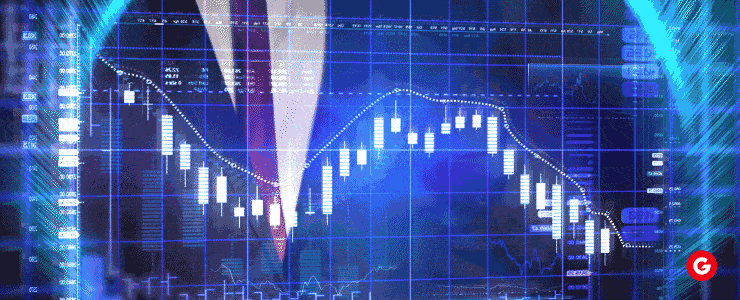With how the world has progressed for the past decade or two, opportunities have grown increasingly more expensive. The world is gradually transferring to an online space and an online mode of communication. With this also comes better connections and better opportunities. The world of online trading may seem an attractive yet intimidating space to enter. While there is a lot of good money to be made in this sphere, it is important to head to it with all the pros, cons, risks, and opportunities in mind.
What is the Forex market?
The forex market facilitates the buying and selling of currencies around the world. The exchange is carried out in the forex market, predominantly through CFD trading. The end goal for a trader on the forex market is to yield a net profit by buying low and selling high and making wise sophisticated predictions about the direction the price of certain shares will go.
Risks
No market or online trading system is not without its faults and risks. Here, the risks are even more serious and should be considered carefully, as real money is on the line. So, it is important to figure out ways to work around these risks before starting CFD trading in the Forex market.
Leverage risk
Shares on the Forex market are leveraged products. On the plus side, this product can be accessed with a small initial investment, called a margin. This means you don’t need a lot of money to start big.
However, this also means that your profit is much greater if you have a profit. But the same goes if things travel in the other direction. Paying a margin means a greater chance of substantial loss
You might have to pay more than anticipated due to unpredictable margin calls. You could face a substantial loss during volatile market conditions, paying way more than just your initial investments.

Interest rate risk
Interest rates have a huge effect on countries’ exchange rates. If there is an influx of investments in a country, its interest rates will increase, and its currency will strengthen. A stronger currency provides higher returns. On the flip side, if interest rates fall, its currency will weaken as investments are withdrawn from the country. As interest rates constantly change, currency values affect forex prices and cause them to fluctuate unpredictably.
And, due to a time difference between the end and start of a contract, exchange rates may change before the trade settlements are set. Along with this, differences in prices and exchange rates may even come about even at different times of the day.
Transaction risks
This involves exchange rate risks due to a time difference and change in exchange rates between the end and start of a trading contract. This may be an added sum that you once again would have to pay and would not be able to anticipate in advance.
Counterparty risk
The counterparty would be the company giving you the asset in your financial transaction. When market conditions are volatile and unreliable, the counterparty may be unable or refuse to adhere to the original requirements and arrangements of the contracts. This may include them no longer fulfilling the obligation to return the sum of money.
Due to the online space needing to be more reliable and untraceable and the agreement not being of a strictly legal nature, such casualties are likely to come about.
Country risk
When considering which currency to invest in, consider the stability and structure of the country you wish to settle your contract with. In many countries, especially developing and third-world countries, it is likely that a currency crisis will occur due to frequent occurrences of payments deficits. This could lead to the devaluation of the currency and subsequently very many negatives on forex trading and prices.
This could also lead to a snowball effect, where investors may begin to withdraw their assets because of heavy speculation of the devaluing in currency. This would lead to the value of currency further going down. Things would not be looking good for investors who have not acted in their footsteps. They would experience their assets being illiquid or experience trouble with their dealers and other credit risks. Forex traders, especially ones from developing countries, may fall particularly prey to these risks.
So, before setting off on your endeavour to the forex market, studying and better understanding the structure and stability of the country from which you’d be trading is good.

Opportunities.
However, we hope you can explore this avenue. Despite all the challenges and risks that may come with this market, there is a lot to look forward to if you wish to embark on a journey toward success.
Forex is currently the most popular market in the world regarding online trading. It has over $5 trillion in daily turnover. Within this constantly evolving industry, opportunities continue to expand for potential traders. As a Forex trader, you are not limited to any one currency. You can instead choose from a variety from various international sources. Your available options are incredibly diverse, with over 70 currency pairs! This multiplies the available options you have for success tenfold.
Available 24 hours, 5 days a week, from anywhere
The nature of CFD trading also makes it possible to access the market and stock updates anytime. This lets you carve out free time from your busy schedule whenever possible. You can also trade from any device, including your mobile, once again allowing you to access your work on the go from wherever is convenient. There are no limits placed due to limiting hours or time zones.
Across the globe
Most forex trading is focused on large hubs like those in the UK, US, China, Japan, or Hong Kong.
The UK accounts for over 43% of global forex trading, averaging $2.7 trillion daily. London is conveniently located right between the U.S. and Asia markets. So, it is an ideal forex trading centre.
With forex trading in the U.S. increasing steadily to over 50% in the last decade, the U.S. is the next most active forex market. Singapore is Asia’s largest forex trading centre, averaging $633 billion in trading volumes in 2019. Hong Kong follows closely behind in Singapore’s footsteps.
Understanding the market
The Forex market holds innumerable opportunities for traders and has expanded incredibly, having grown from 1.9 Quadrillion dollars in 2016 to 2.4 Quadrillion dollars in 2019.
Forex trading is an incredible option to start off with because you don’t have to pay any exchange or regulatory fees. So, the overall trading and initial investment costs are. you can start off early even if you don’t have a lot to give, to begin with.
Across the forex market, 170 major, minor, and exotic currency pairs can be traded as contracts for difference (CFDs). So, the options and variations are limitless.
Combating Trust and making the first step.
The main issue that stops traders from starting with CFD trading on the Forex market or in general is the need for more trust. The system may need to be more reliable. You should also be more careful in your trading journey.
This is where using a reliable and well-known platform is a massive solution. Regarding CFDs, the MetaTrader trading platform has been established as the standard platform. This platform is highly efficient no matter where you are on your trading journey. You can also access the platform from any device, including your desktop, tablet, or phone.
This platform also provides additional insights on charts and updates on shares. So, if you’re a beginner, you have a helping hand guiding you through the journey.
If you are getting into trading and want a trustworthy, reliable, and user-friendly platform to enter the forex market, check out FX Giants to start your seamless journey today.
Conclusion
So, when tackling the field of online trading, it is important to study what pros and cons of it. Doing your research and heading on to the field knowing what you’re doing is important. So, do not be afraid to take risks. With the guidance of a reliable trading platform and market, and take your first leap toward success!
DISCLAIMER: This information is not considered investment advice or an investment recommendation, but is instead a marketing communication
